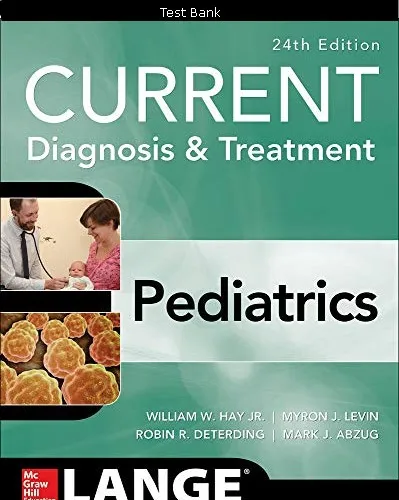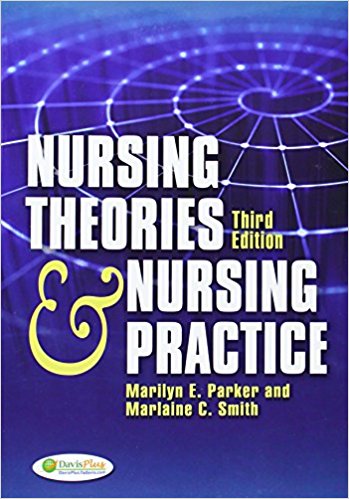CURRENT Diagnosis and Treatment Pediatrics 24th Edition Hay Levin Test Bank
$55.00 Original price was: $55.00.$24.00Current price is: $24.00.
Digital item No Waiting Time Instant Download
Chapters: ALL
Format: PDF
ISBN-13: 978-1259862908
ISBN-10:1259862909
Publisher: MG Hill
Authors: William Hay, Myron Levin, Robin Deterding, Mark Abzug
Description
CURRENT Diagnosis and Treatment Pediatrics 24th Edition Hay Levin Test Bank
Table of Contents
•A practical, up-to-date well-referenced guide to the diagnosis and treatment of the most commonly seen medical conditions in children
•Excellent coverage of The Council on Medical Student Education in Pediatrics (COMSEP) curriculum used in pediatric clerkship
•46 chapters cover a wide range of topics, including neonatal medicine, child development and behavior, emergency and critical care medicine, and diagnosis and treatment of specific disorders according to major problems, etiologies, and organ systems
•A wealth of tables and figures provide quick access to important information, such as acute and critical care procedures in the delivery room, the office, the emergency room, and the critical care unit; anti-infective agents, drug dosages
schedules, differential diagnoses, and developmental disorders.
Includes detailed descriptions of diseases as well as diagnostic and therapeutic procedures
•Complete with handy guide to normal laboratory values
•Presented in the consistent, easy-to-follow CURRENT format
•Valuable to medical students, pediatric residents, pediatricians, family practitioners, nurses, nurse practitioners, physician assistants, and other healthcare providers who work with infants, children, and adolescents
•Authors are practicing pediatricians to ensure that each chapter reflects the needs and realities of day-to-day practice
CURRENT Diagnosis and Treatment Pediatrics, Twenty-Fourth Edition 24th TESTBANK
Chapter 1 The Newborn Infant
1. Which milestone is developmentally appropriate for a 2-month-old infant when the nurse pulls
the infant to a sitting position?
a. Head lag is present when the infants trunk is lifted.
b. The infant is able to support the head when the trunk is lifted.
c. The infant is briefly able to hold the head erect.
d. The infant is fully able to support and hold the head in a straight line.
ANS: C
A 2-month-old infant is able to hold the head erect only briefly and continues to have some head
lag. It is not until 4 months of age that the infant can keep his or her head in a straight line when
pulled to a sitting position.
2. Approximately what should a newborn weigh at 1 year of age if the newborns birth weight
was 7 pounds 6 ounces?
a. 14 3/4 pounds
b. 22 1/8 pounds
c. 29 1/2 pounds
d. Unable to estimate weight at 1 year
ANS: B
An infant triples the birth weight by 1 year of age. An infant doubles the birth weight by 6
months of age. An infant quadruples the birth weight by 2 years of age. Weight at 6 months, 1
year, and 2 years of age can be estimated from the birth weight.
3. Which statement made by a parent would be consistent with a developmental delay?
a. I have noticed that my 9-month-old infant responds consistently to the sound of
his name.
b. I have noticed that my 12-month-old child does not get herself to a sitting
position or pull to stand.
c. I am so happy when my 1 1/2-month-old infant smiles at me.
d. My 5-month-old infant is not rolling over in both directions yet.
ANS: B
Critical developmental milestones for gross motor development in a 12 month old include
standing briefly without support, getting to a sitting position, and pulling to stand. If a 12-monthold child does not perform these activities, it may be indicative of a developmental delay. An
infant who responds to his name at 9 months of age is demonstrating abilities to both hear and
interpret sound. A social smile is present by 2 months of age. Rolling over in both directions is
not a critical milestone for gross motor development until the child reaches 6 months of age.
4. At a healthy 2-month-old infants well-child clinic visit, the nurse should give which
immunizations?
a. DTaP, IPV, HepB, Hib, PCV, rotavirus
b. MMR, DTaP, PVC, and IPV
c. Hib, DTaP, rotavirus, and OPV
d. Hib and MMR, IPV, and rotavirus
ANS: A
DTaP, IPV, HepB, Hib, PCV, and rotavirus are the appropriate sequence of immunizations for a
healthy 2-month-old infant. MMR is given at or after 12 months of age. Oral polio vaccine
(OPV) is no longer administered in the U.S.
5. The nurse advises the mother of a 3-month-old infant, exclusively breast-fed, to:
a. start giving the infant a vitamin D supplement.
b. start using an infant feeder and add rice cereal to the formula.
c. start feeding the infant rice cereal with a spoon at the evening feeding.
d. continue breast-feeding without any supplements.
ANS: A
Breast milk does not provide an adequate amount of dietary vitamin D. Infants who are
exclusively breast-fed need vitamin D supplements to prevent rickets. An infant feeder is an
inappropriate method of providing the infant with caloric intake. Solid foods and rice cereal are
not recommended for a 3-month-old infant. Solid feedings do not typically begin before 4 to 6
months of age. Because breast milk is not an adequate source of fluoride, infants need to be
given a fluoride supplement.
6. At _____ months of age, an infant should first be expected to locate an object hidden from
view.
a. 4
b. 6
c. 9
d. 20
ANS: C
By 9 months of age an infant will actively search for an object that is out of sight. Four-monthold infants are not cognitively capable of searching out objects hidden from their view. Infants at
this developmental level do not pursue hidden objects. Six-month-old infants have not developed
the ability to perceive objects as permanent and do not search out objects hidden from their view.
Twenty-month-old infants actively pursue objects not in their view and are capable of recalling
the location of an object not in their view. They first look for hidden objects around the age of 9
months.
7. The parents of a newborn infant state, We will probably not have our baby immunized because
we are concerned about the risk of our child being injured. Which is the best response for the
nurse to make?





Be the first to review “CURRENT Diagnosis and Treatment Pediatrics 24th Edition Hay Levin Test Bank”